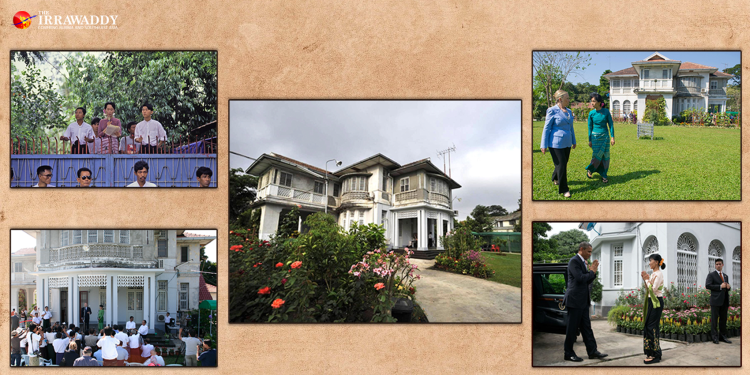The military junta’s recent failure to auction off the home of imprisoned civilian leader Daw Aung San Suu Kyi encapsulates perfectly how the Myanmar people view both “The Lady”, as she is known, and her jailer, junta chief Min Aung Hlaing. While the elected civilian leader remains hugely popular despite having been out of public view for more than three years, the regime boss has become a hate figure for the majority of the population.
The historic, iconic family property in Yangon has been at the center of an ownership dispute between Daw Aung San Suu Kyi and her estranged older brother U Aung San Oo, a US citizen based in California, since the latter filed a case in a Yangon court seeking an equal inheritance share of the property, although as a foreign national he is not legally allowed to own or sell it. In 2016, the court divided the property, giving each of the siblings half—a decision that U Aung San Oo repeatedly appealed.
Eventually, a junta-controlled court ruled in favor of U Aung San Oo, ordering the house at No. 54 University Avenue to be auctioned off on March 20 with a starting bid of US$90 million, in a move seen as part of the junta’s attempt to erase every trace of the ousted civilian leader.
Daw Aung San Suu Kyi has been detained since her government was overthrown by the military coup in February 2021 and is now in solitary confinement in Naypyitaw Prison, serving a 33-year term after being convicted by the regime of various charges brought against her, all widely dismissed as spurious. Daw Aung San Suu Kyi’s lawyers challenged the court’s auction order on the grounds that the sale would be held without her consent, but they were unsuccessful.
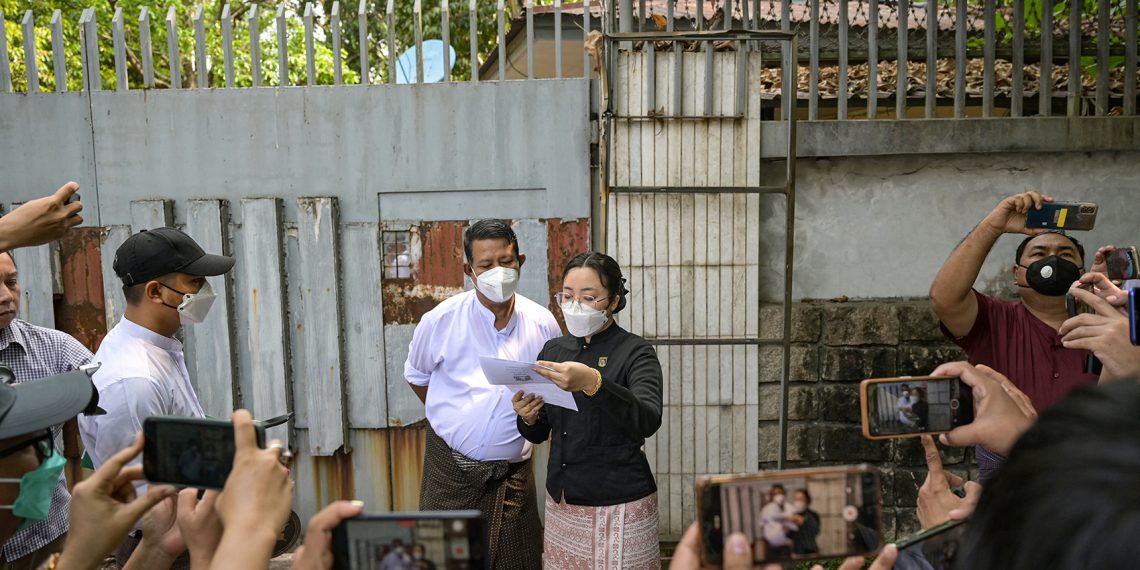
In a sign of the general public’s unwavering adoration and support for the detained 78-year-old leader, no bidders turned up on auction day.
“There is no one to bid,” an auctioneer announced in front of the gate of the house on the morning of March 20. Later, auction officials announced that the auction had ended in failure.
The junta’s unsuccessful auction of the iconic property stands in stark contrast to the sale of the nearby Yangon mansion of junta chief Min Aung Hlaing by the National Unity Government (NUG) last year.
Last May, the NUG, which was formed by elected lawmakers and their ethnic allies in the wake of the coup, put Min Aung Hlaing’s mansion at 14 Inya Road in an affluent Yangon neighborhood up for sale for $10 million (a third of its estimated market value) as part of its fund-raising scheme for the ongoing revolution against the military regime. The NUG has announced it will reclaim all properties and land illegally acquired by junta generals.
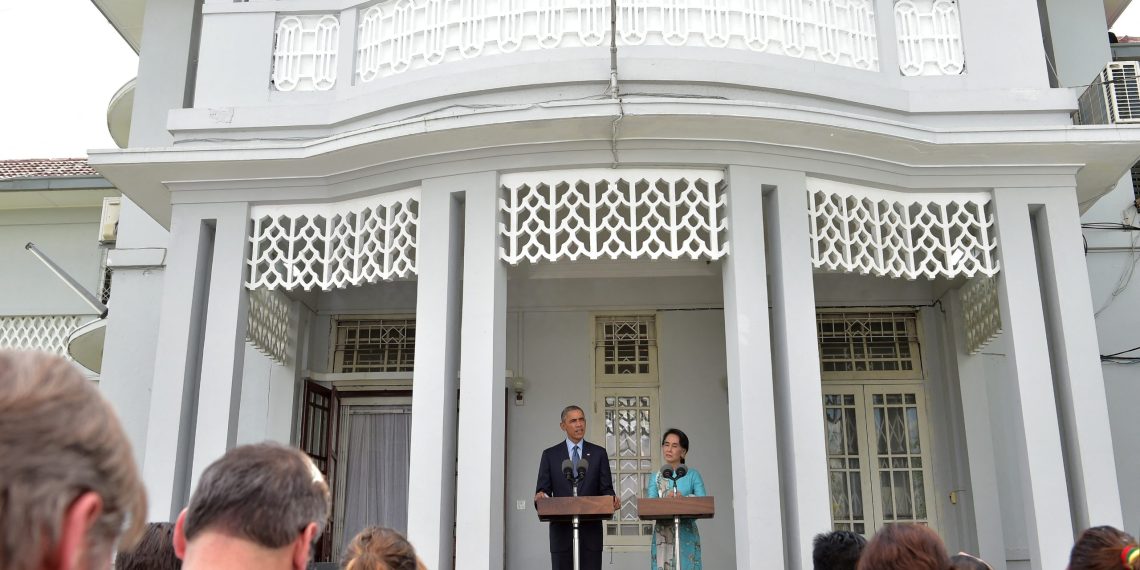
The sale was embraced by the Myanmar people and the mansion has become highly sought after. Shares began selling as soon as the property went on sale. More than 12,400 people, mostly Myanmar nationals—both at home and abroad—bought the shares and the sale reached its target of $10 million on July 30.
Shareholders will receive a proportion of the proceeds when the property is sold at auction if the NUG takes power. However, most buyers weren’t motivated by financial considerations; rather they saw it as a way of punishing the junta chief—who acquired the home illegally and has been torturing and killing civilians since the coup—and of contributing to the ongoing revolution.
“I bought it [a share in the house] as I want to see the fall of Min Aung Hlaing as soon as possible,” a buyer commented on a post about the NUG’s sale.
No. 54 vs. 14 Inya
For many in Myanmar, the historic residence of Daw Aung San Suu Kyi, which is often referred to simply as “No. 54”, is a symbol of the country’s struggle for democracy, while the 14 Inya mansion of Min Aung Hlaing is considered a showcase for the coup leader’s corruption and greed.
The two-story colonial-era house on University Ave. was given to Daw Aung San Suu Kyi’s mother, Daw Khin Kyi, by the then government in 1947, following the assassination of her husband, independence hero General Aung San. Daw Khin Kyi lived in the house until her death in 1988.
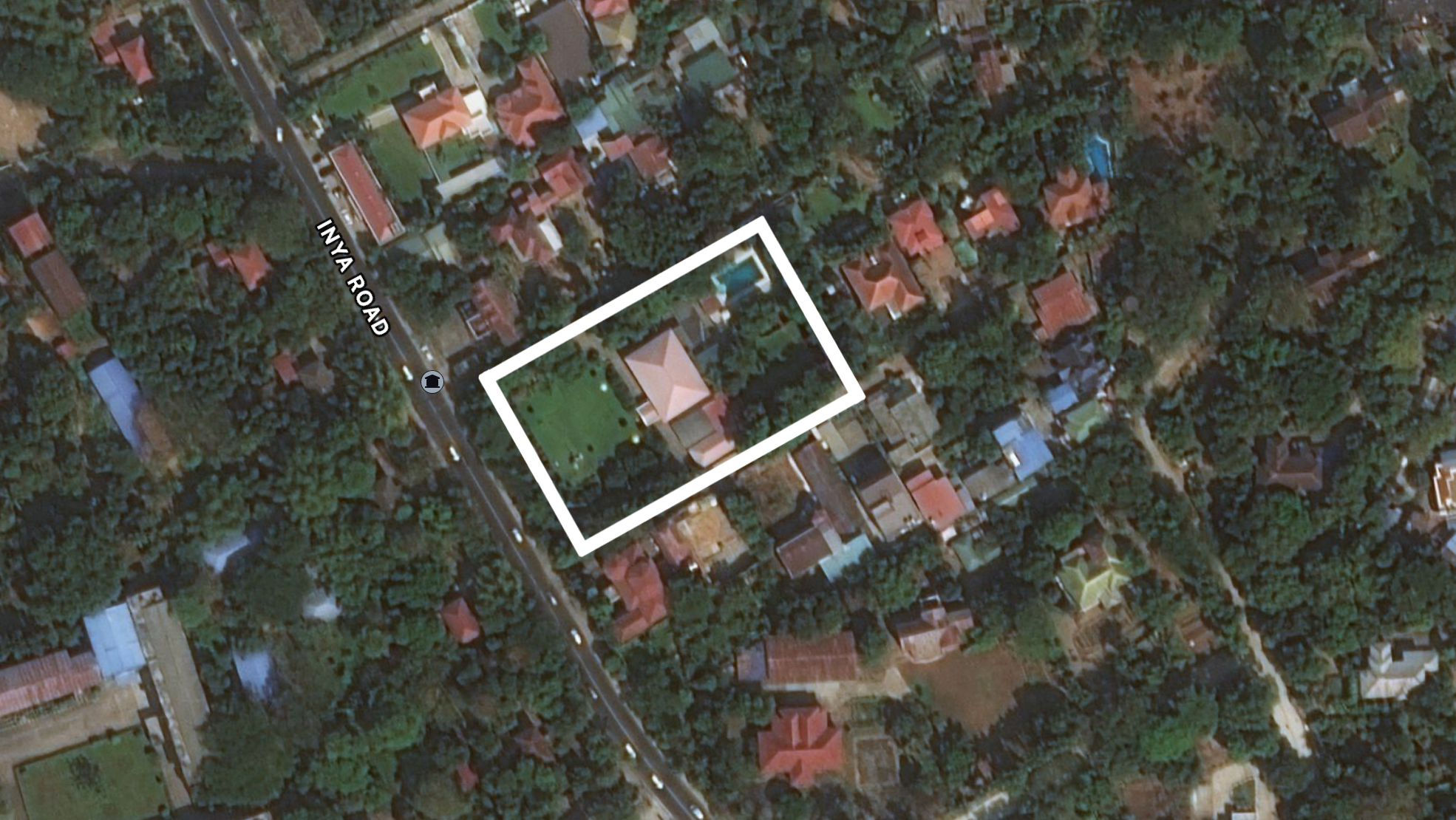
Daw Aung San Suu Kyi began her campaign for democracy from it, using it as the first headquarters of her party, the National League for Democracy. She would go on to spend a total of 15 years under house arrest there, in various stints between 1989 and 2010, as a prisoner of earlier military juntas.
Under the previous regime, people in their thousands gathered at the residence’s gate to hear Daw Aung San Suu Kyi deliver addresses promoting democracy and free speech. After she was released from house arrest, the democracy leader received a string of international dignitaries at the house, including then-US President Barack Obama and Secretary of State Hillary Clinton in 2011 and 2012.
Daw Aung San Suu Kyi intended to use her inheritance as the basis for the Daw Khin Kyi Foundation, a charity founded by her and named after her mother.
Meanwhile, the 14 Inya mansion of Min Aung Hlaing, which sits on a 1.86 acre (0.75 hectare) plot, was once a military guesthouse, commonly referred to as the “military intelligence guesthouse”, where the ruling generals received foreign diplomats and ethnic armed organization leaders. VIPs were often greeted on its lawn.
In the 1990s, military spy chief Khin Nyunt liked to celebrate the Thingyan Water Festival at the guesthouse, along with other senior members of the then junta as well as artists and musicians.
Min Aung Hlaing took over 14 Inya around 2011 or 2012, when he became the military’s commander in chief, in a move that left a bad taste in the mouths of many of the other top brass.
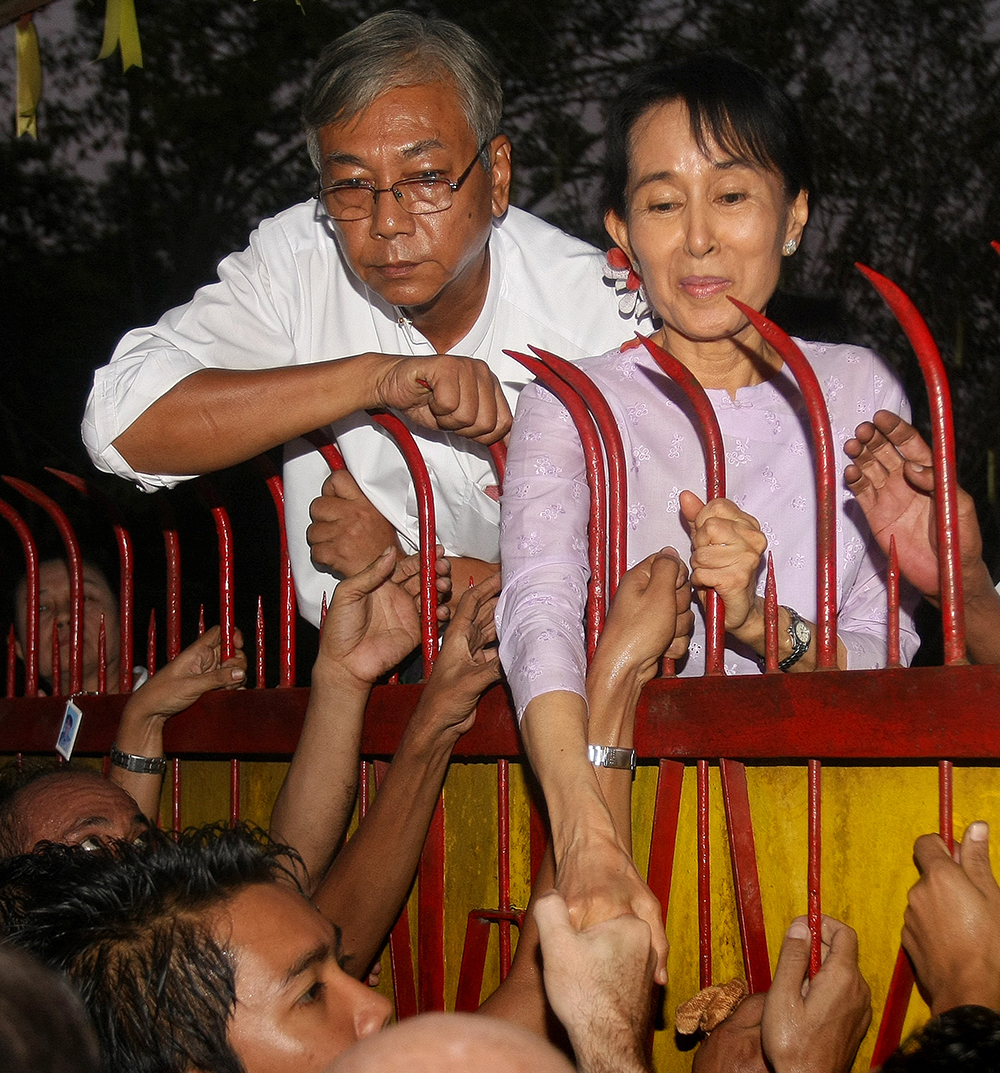
Most Myanmar people want to preserve Daw Aung San Suu Kyi’s home at No. 54 as a national heritage site in recognition of its historical importance, and would love to see 14 Inya repossessed from Min Aung Hlaing and demolished.
Although the auction failed on March 20, the ruling in favor of U Aung San Oo stands and the court can order another auction.
Prominent pro-democracy activist Dr. Tayzar San said the people’s embrace of the sale of the regime chief’s mansion and the high demand for the shares showed the strength of the public’s disgust and hatred toward the military dictatorship and “terrorist” leader Min Aung Hlaing. But no one would buy the home of the country’s elected leader, he said.
“We, the public, don’t accept the unjust ruling ordering the auction. And one thing is for sure: Not a single member of the general public would buy it, no matter how rich they are. Who would buy the house [of] the country’s leader, who is respected and loved by people and currently under unjust detention,” he said.
“If someone does bid for it in future, that person will be from the junta’s military group or a junta crony or one of their supporters. And we the public will note it carefully.”
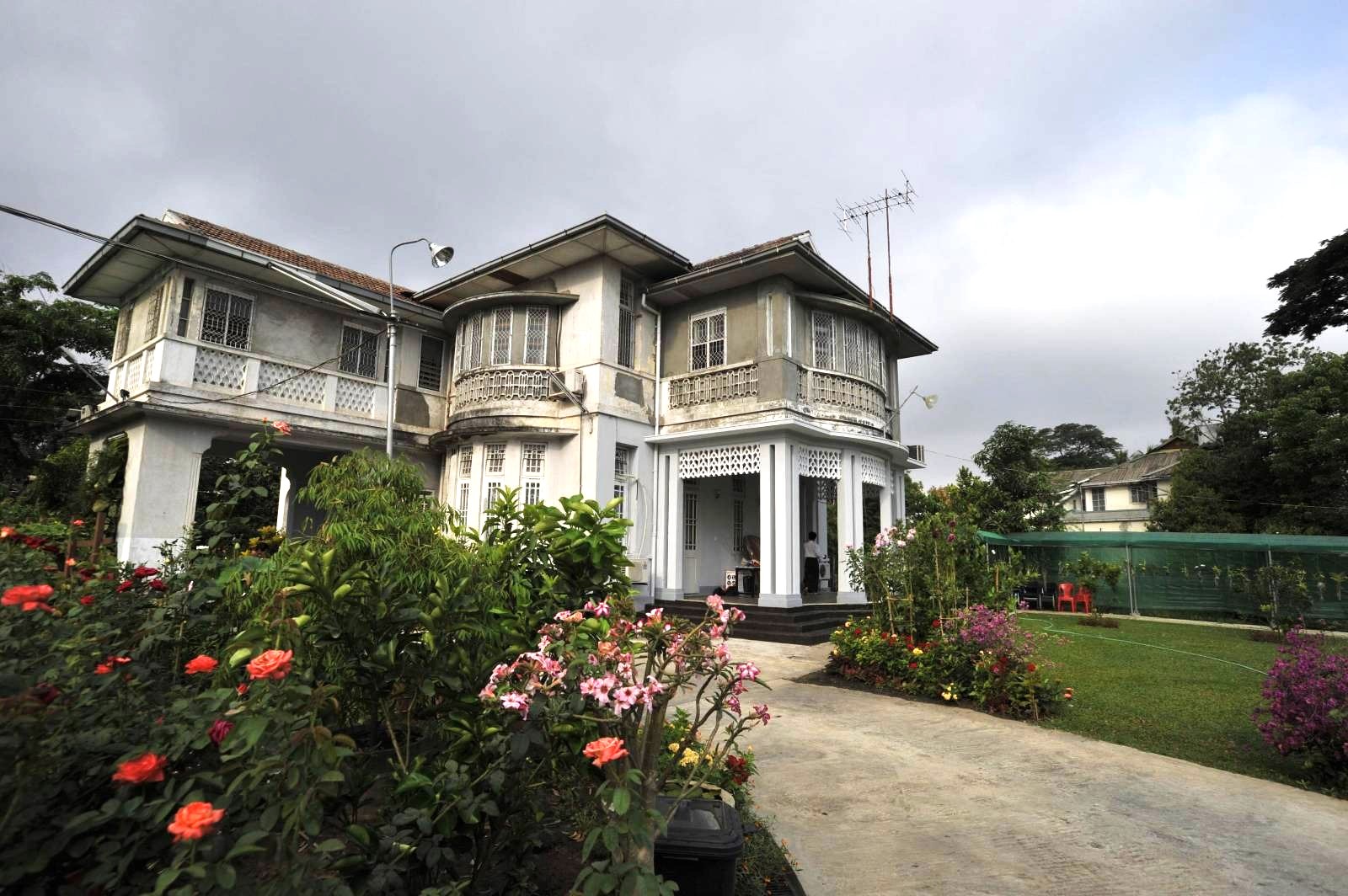
The NUG declared No. 54 a national-level cultural heritage site in September 2022. The civilian government has warned it will take legal action against anyone seeking to own, sell, destroy, alter, or otherwise use the property.
Speaking to The Irrawaddy recently, NUG spokesperson U Kyaw Zaw warned that no sale or auction carried out under the coup regime can be regarded as legitimate.
He reiterated the NUG’s warning that those involved in buying the house will not only lose their investment, but also be punished in accordance with the law.
Whoever buys it or attempts to destroy it will go down in history as one who “stole from the state” and a “traitor,” many people commented on social media, while adding that they wished to see the residence preserved as a national heritage.
This article is supported by the Transition Promotion Programme, Ministry of Foreign Affairs of the Czech Republic.


